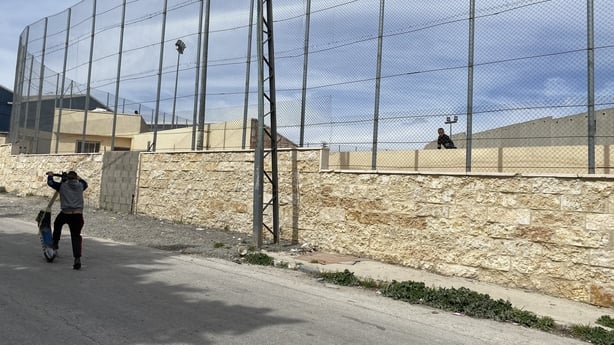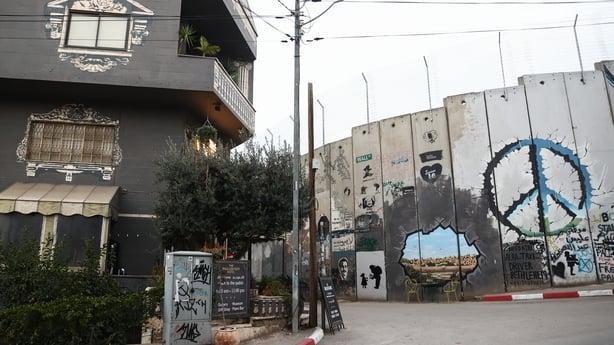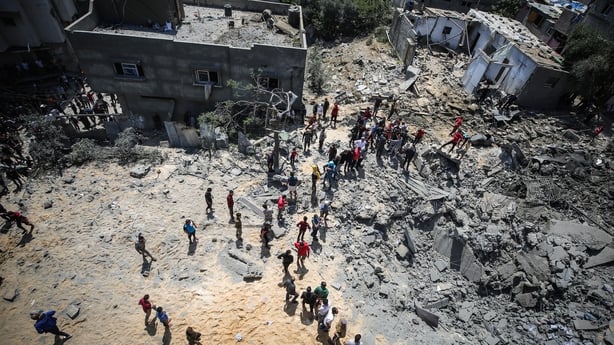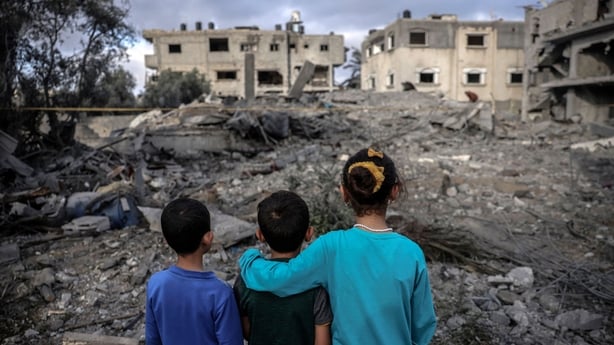This is not a job. It's a mission. A calling.
That’s how Dr Amal Jadou Shakaa, Palestinian Deputy Minister for Foreign Affairs, describes her role.
You might roll your eyes at a politician describing their job as a vocation.
But perhaps not with Dr Jadou. Firstly, young, female politicians are relatively rare in the Arab world, but also Dr Jadou, who was a graduate fellow at Harvard Law School, was born in a refugee camp.
There’s an old joke where a man standing at the corner of 57th Street and Seventh Avenue in New York City is asked "Sir, can you tell me how to get to Carnegie Hall?" by a person presumably looking for directions.
And the answer is "practice, practice, practice", I’m reminded of it when I ask Amal Jadou how she got from Aida camp to Harvard.
She puts it down to a lot of hard work, but also a pervasive sense of justice among Palestinians and a high regard for education among families.

Dr Jadou says: "Believing in justice and believing that God is justice and that justice will prevail no matter what.
"I mean, if I didn't believe that my cause was a just one and that I serve in order to achieve my people's right to self-determination and independence, I wouldn't be taking this job because it's such a tough one."
Visiting Aida refugee camp in Bethlehem last March, I was struck by its sense of permanence.
Refugee camps are often temporary, filled with tents that grow in number depending on need.
But as with much in Palestine, Aida is different. The UN-operated refugee camp is 75 years old and very much made of bricks and mortar.
Many buildings are ramshackle and have clearly been added to over the years as families grow.
During our visit, there was a strike by UNRWA staff, so rubbish was piling up in the streets.
It’s a claustrophobic place, as houses are built on top of one another, quite literally in some cases.
The area of the camp is little larger than the size of Croke Park and has over 6,000 people living there.

What’s perhaps most striking of all, is its proximity to the Israeli separation wall, which is around 10m high in Bethlehem.
Speaking to the head of the Kindergarten, Najar Khalil, she says children are mostly very angry in Aida. "They don’t see a horizon, a future."
But Dr Jadou, as is perhaps to be expected from someone in her profession and position, is more hopeful.
She has to be and says: "It’s essential to provide people with a political horizon because that will give them hope."
Asked about whether some children, particularly young boys, are radicalised in other camps, Dr Jadou bristles somewhat.
It’s a touchy subject. In January, a 13-year-old Palestinian boy shot an Israeli father and son, while in February, another 13-year-old Palestinian boy was charged with murder, after stabbing an Israeli border guard.
I don’t bring up specific incidents with Dr Jadou, so her comments are not related, but she says she understands the frustration of some residents of refugee camps.
She says: "There is a high percentage of unemployment for many of those who are university graduates and basically have masters and PhD's and they cannot find jobs because [of the economy of Palestine.
"I mean, we are a country under occupation. Imagine what it means for a Palestinian economy that depends endlessly on...international financial support that has dropped in the past few years.
"But it's also very important to keep engaging with people. Obviously, when you lose hope, you try to take things into your [own] hands."

Dr Jadou visited Ireland last month for talks with officials from the Department of Foreign Affairs. Asked about the reason for her visit, Dr Jadou is effusive.
"So many Palestinians or I think maybe every Palestinian loves Ireland, although they have never been to Ireland and the reason for that is the empathy, sympathy and solidarity that the Irish people show towards Palestine."
She goes on to say that the Palestinian Authority is keen to "move the peace process forward", to "push for alleviating the pain and the suffering that the Palestinian people are undergoing now as a result of the ongoing Israeli occupation of our land".
It’s been a grim year for Israeli-Palestinian relations.
After five days of fighting between Israel and Islamic Jihad, Egypt managed to mediate a ceasefire, bringing a return to relative normality yesterday.
While last year was the bloodiest in almost 20 years, with around 200 Palestinians killed by Israelis, 2023 isn’t looking much better.
So far in 2023, more than 120 Palestinians have been killed, according to Palestinian figures, around five times the number of Israelis killed during the same period.
Dr Jadou describes the situation as devastating and decries what she calls the ongoing process of "settler colonialism."
"Today we speak of more than 750,000 Israeli settlers that have been moved from Israel proper to the occupied territories in violation of the Fourth Geneva Convention that prohibits occupying powers from moving their citizens into the occupied territory and Israel has been indulged in this process, moving its citizens, in fact, providing them with huge economic incentives in order to move to the occupied territories and these settlers are moving into the occupied territory to basically live on appropriated territory."
The current Israeli government is the most right-wing government ever seen, with an Israeli settler, Bezalel Smotrich, holding the position of Finance Minister, and ultra-nationalist Itamar Ben Gvir, who’s the Minister for National Security, among its members.
So how do you negotiate with such a government?
Dr Jadou says: "This government does not believe in the globally accepted solution to this conflict. The two-state solution. They want to undermine it completely. They want us to basically be relocated."
And this is the nub of why Minister Jadou visited Ireland.
She says: "The Palestinian leadership and the Palestinian people continue to adhere to international law... that's basically part of why I'm here is to talk to my counterparts on ways to encourage the international community to push on applying international law.
"All we're asking for is implementing the more than 1,000 resolutions that were that were adopted in the United Nations Security Council and General Assembly on the Palestinian question."
Without naming Russia’s invasion of Ukraine, Dr Jadou alludes to the double standards that many Palestinians cite when it comes to the two conflicts.

"When we see in other conflicts, the international community rushes to implement international law, to implement sanctions and to take measures...we believe in the universality of international law and we start wondering, you know, we cannot cherry pick when it comes to implementing international law."
What does Dr Jadou say to Israel’s point that it’s simply defending itself?
"Israel has the right to defend itself, as every other country has the right to defend themselves, and Palestine is basically the country that has been paying the huge price.
"Because, you know, our security is not guaranteed at all. Basically, we believe that the root cause of all the violence that happens and the conflict itself is occupation...these soldiers...their boots are on our necks.
"Why are they moving their settlers into the occupied territory? If they withdraw their settlers and their army from the occupied territories and we establish peace.
"I think the only guarantor fear for security, for real genuine security is basically to establish peace."
Today marks the 75th anniversary of what Palestinians call al-Nakba or "the Catastrophe" which saw the expulsion of over 750,000 Palestinians from their land as part of the foundation of the State of Israel in 1948.
Dr Jadou is calling on Ireland to formally recognise the State of Palestine, as agreed on by both houses of the Oireachtas.
"We want Ireland and other European countries that have not recognised [the State of Palestine] to recognise and we also want the United States of America to recognise the state of Palestine, because this will salvage the two-state solution and this will infuse huge hope in the Palestinians."
Last January, Tánaiste Mícheál Martin said in response to questions on Ireland’s recognition of Palestine: "In the absence of progress towards a two-State solution, I would be prepared to recommend to the Government recognition by Ireland of a State of Palestine, if and when it might be helpful, and this is a matter which I discuss regularly with EU colleagues.
"If recognition by Ireland happened outside the context of an overall peace agreement, this would be likely to have an adverse effect on Ireland’s influence on the Israeli-Palestinian conflict at EU and international level. "The timing and context of any such decision would affect whether such a loss of influence would be matched by a commensurate benefit for the Palestinian people and a positive impact on the peace process and a two-State solution."
A spokesperson for the Department of Foreign Affairs said: "The consultations with Dr Amal Jadou provided a valuable opportunity for a detailed exchange on the recent deeply troubling developments in the occupied Palestinian territory and to update on Ireland’s continuing engagement on this issue, including at EU and international level."
Juliette Gash travelled to Palestine in March 2023 as part of a group funded by the EU Coordinating Office for Palestinian Police Support which is the European Union Police and Rule of Law Mission for the Palestinian Territory.
EUPOL COPPS is one of several EU bodies working in the territory. This visit did not include meetings with Israeli officials.







